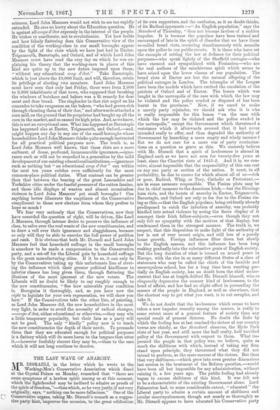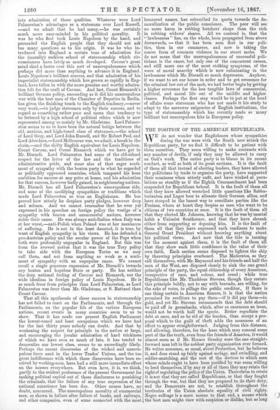THE LAST WAVE OF ANARCHY.
11-1 R. DISRAELI, in the letter which he wrote to the 1YJL Working-Men's Conservative Association which dined at the Crystal Palace on Monday, remarked that "there are some symptoms of a lawless spirit among us at this moment, which the lightheaded may be inclined to admire as proofs of the spirit of freedom,"—than which, as he very justly, if not very originally, says, "nothing can be more fallacious." One of the Conservative organs, taking Mr. Disraeli's remark as a sugges- tive party hint, improves the occasion, to the great edification of its own supporters, and the confusion, as it no doubt thinks, of its Radical opponents :—" An English population," says the Standard of Thursday, "does not become lawless of a sudden impulse. It is because the populace have been trained and encouraged of late in the spirit of disorder that we have these so-called bread riots, occurring simultaneously with assaults upon the police in our public streets. It is those who have set the example of setting the law at defiance for their political purposes—who speak lightly of the Sheffield outrages—who have excused and sympathized with Fenianism—who are the real authors of the mischievous spirit which seems to have seized upon the lower classes of our population. The bread riots of Exeter are but the natural offspring of the political outrages in London. The triumphs of the League have been the models which have excited the emulation of the patriots of Oxford and of Exeter. The lesson which was taught in the metropolis of the ease with which the law may be violated and the police evaded or disposed of has been learnt in the provinces." Now, if we cared to make a merely party rejoinder, we should ask who it is who is really responsible for this lesson "on the ease with which the law may be violated and the police evaded in the metropolis," except the Government which threatened a resistance which it afterwards avowed that it had never intended really to offer, and thus degraded the authority of Government by launching a mere empty and windy menace? But we do not care for a mere war of party recrimina- tions on a question so grave as this. We sincerely believe with Mr. Disraeli that a spirit of lawlessness is abroad in England such as we have not seen for twenty-five years at least, since the Chartist riots of 1841-2. And it is, we con- ceive, almost impossible that the responsibility of this can rest on any one party or section of the nation. It must, in all probability, be due to causes for which almost all of us—rich or poor, Radical, Whig, or Tory, Catholic or Protestant,— are in some measure responsible. The Fenian plots may be due in chief measure to the American Irish,—but the Birming- ham riots, and the bursts of anarchy in Exeter, Teignmouth, Barnstaple, and Oxford are only so far due to the Fenian ris- ing as this,—that the English populace, being evidently already predisposed to catch the infection of anarchy, was probably kindled into actual violence by seeing the fierce display of it amongst their Irish fellow-subjects,--even though they not only felt no sympathy with the motives of that display, but condemned them in the strongest manner. The truth is, we suspect, that this disposition to make light of the authority of law is not of very recent origin, and still less of a purely home growth. Foreign influences filter down but slowly to the English masses, and this influence has been long soaking gradually into the substantive grain of English society. But the long duration of what is termed an armed peace in Europe, with the rise in so many different States of a class of statesmen who may be called the chiefs of the forcible and unscrupulous school, has for a long time been reacting par- tially on English society, has no doubt been the chief under- current that has at length drifted Mr. Disraeli himself, who so eloquently deprecates the coarser kind of lawlessness, to the head of affairs, and has had no slight effect in persuading the masses of the people in England, as well as elsewhere, that the shortest way to get what you want, is to cut scruples, and take it.
We do not doubt that the lawlessness which seems to have taken a new impulse recently among the masses, is really to some extent more of a general feature of society than any special result of present distress. No doubt the links by which the feeling has at last reached the rioters of our country towns are chiefly, as the Standard observes, the Hyde Park riots of last year, and still more the half crafty, half terrified policy of the Government with respect to them. What im- pressed the people in that policy was, we believe, quite as much the shiftiness with which, instead of taking any firm stand upon principle, they threatened what they did not intend to perform, as the mere success of the rioters. But then that very shiftiness,—which grew into even greater dimensions last session in the treatment of the Reform question,—would have been all but impossible for any administration, without ruining it, a few years ago. The public feeling had already begun to excuse shiftiness of this kind. It was felt not to be a characteristic of the existing Government alone. Lord Palmerston had, to some considerable extent, " educated " the Liberal party to admire a certain amount of shiftiness and jocular unscrupulousness, though not nearly so thoroughly as Mr. Disraeli appears to have educated his Conservative party into admiration of those qualities. Whatever were Lord Palmerston's advantages as a statesman over Lord Russell, —and we admit that he had many,—he was certainly much more easy-minded in his political morality. It was he who first took Louis Napoleon by the hand, and persuaded the English people that they should not ask too many questions as to his origin. It was he who in- troduced into England a certain tone of admiration for the (morally) reckless school of statesmanship which cir- cumstances have lately so much developed. Cavour's great mind shed a lustre over this sort of unscrupulousness which perhaps did more than anything to advance it in England. Louis Napoleon's brilliant success, and that admiration of his imperialist statesmanship which has grown so rapidly in Eng- land, have fallen in with the more genuine and worthy admira- tion felt for the craft of Cavour. And last, Count Bismarck's brilliant German policy, succeeding as it did his unscrupulous war with the best men of the Chamber of Deputies in Berlin, has given the finishing touch to the English tendency,—never very weak,—to judge statesmen only by their success, and to regard as something rather poor and mean that tendency to be fettered by a high school of political ethics which is now represented among us mainly by Mr. Gladstone. Lord Palmer- ston seems to us to have been the natural bridge between the. old, anxious, and high-toned class of statesmen,—the school of Lord Grey, and Lord John Russell, and Sir Robert Peel, and Lord Aberdeen,—Lord Melbourne was, we-admit, a break in the chain,—and the shifty English equivalent for Louis Napoleon, Count Cavour, and Count Bismarck which we have got in Mr. Disraeli. Lord Palmerston had some of the old-school respect for the letter of the law and the traditions of administrative pride, and some also of that eager senti- ment of sympathy with the beaten party in what he regarded as politically oppressed countries, which tempered his keen ambition for success at any price at home, and his admiration far that success, however badly gained, in neighbouring nations. Mr. Disraeli has all Lord Palmerston's unscrupulous side, and none of the modifying sympathies or traditions which made Lord Palmerston so true an Englishman. He has proved how utterly he despises party pledges, however deep and solemn. And we cannot remember that he ever yet expressed in his speeches on foreign policy the vestige of 'a sympathy with beaten and unsuccessful nations, however noble their cause. He was always anti-Italian when Italy was at her worst,—anti-Polish when Poland was at her maximum of suffering. He is not in the least daunted, it is true, by want of English sympathy in his views. He has defended a pro-Austrian policy and the secular power of the Pope when both were profoundly unpopular in England. But this was from the avowed notion that it was the true Tory policy to take side with the European Tories as we may call them, and not from anything so weak as a senti- ment of sympathy with an unpopular cause. We cannot recall a single generous expression of Mr. Disraeli's towards any beaten and hopeless State or party. He has neither the deep national feeling of Cavour and Bismarck, nor the wide idealism in foreign policy of Louis Napoleon. He is as much freer from principles than Lord Palmerston, as Lord Palmerston was freer than Mr. Gladstone, or S. Rattazzi than Count Cavour.
That all this apotheosis of sheer success in statesmanship has not failed to react on the Parliaments, and through the Parliaments, on the popular life of the various European nations, recent events in many countries seem to us to show. That it has made our present English Parliament the lowest-toned and least scrupulous which we have had for the last thirty years nobody can doubt. And that by weakening the respect for principle in the nation at large, and encouraging the jocular admiration of hard trickiness of which we have seen so much of late, it has tended to demoralize our lowest class, seems to us exceedingly likely. Perhaps the recent discoveries of the wicked and unscru- pulous force used in the lower Trades' Unions, and the too great indifference with which these discoveries have been re- ceived by working-men, have had a still more immediate effect on the masses everywhere. But even here, it is, we think partly to the evident preference of the present Government for making political capital out of those disclosures to panishing the criminals, that the failure of any true expression of the national conscience has been due. Other causes have, no doubt, concurred. The unscrupulous morality of commercial men, as shown in failure after failure of banks, and railways, and other companies, even of some connected with the most honoured names, has subscribed its quota towards the de- moralization of the public conscience. The poor will see no more harm in robbing butchers' shops than the rich in robbing widows' shares. All we contend is, that the "lawlessness" has, on the whole, been propagated from above downwards, — that it has been seen first in our poli- tics, then in our commerce, and now is taking the coarse form of common violence in our street mobs. We do not mean that the unscrupulousness of successful poli- ticians is the cause, but only one of the concurrent causes, and still more one of the most striking symptoms, of the wave of moral anarchy which is now culminating in the lawlessness which Mr. Disraeli so much deprecates. Anyhow, if we want to set our house in order and to get reverence for the criminal law out of the mob, we had better begin by getting a higher reverence for the less tangible laws of commercial, political, and moral life out of the middle and higher classes. Perhaps the first step would be to put at the head of affairs some statesman who has not made it his study to adapt to the narrower exigencies of English institations, the type of statesmanship which has recently made so many brilliant but unscrupulous hits in European policy.



































 Previous page
Previous page